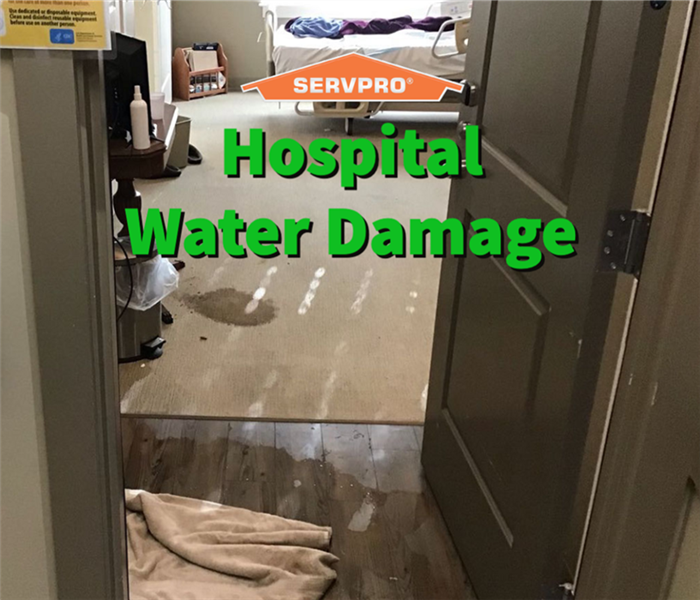Hospital Water Damage: 4 Costly Outcomes No One Talks About
1/30/2023 (Permalink)
Water damage is a severe problem for hospital facilities because it can have devastating consequences for hospital staff, patients, and equipment.
From the loss of medical equipment and essential documents to mold growth and structural risks, hospital water damage can have a lasting impact on hospital operations.
We have put together the following blog post to discuss the four most impactful consequences of hospital water damage and provide information about how healthcare facilities can reduce the risk of hospital water damage.
SERVPRO of East and South Dayton is here to help hospital facilities mitigate the effects of hospital water damage in the community we serve. We are dedicated to providing hospital facilities with the best water damage restoration services.
What is hospital water damage?
Hospital water damage is an accumulation of damages caused by excess moisture, including flooding, leaking, and other forms of water intrusion. Water damage can come from internal sources like plumbing failures, broken pipes, and leaks in walls and ceilings; or external sources such as natural disasters like intense storms.
Water damage in hospital facilities can be extremely costly due to the hospital’s need for functioning medical equipment and its responsibility to protect patient health and safety.
The 4 costly consequences of hospital water damage
Now that you are aware of what hospital water damage is and its potential costs let’s discuss the consequences of hospital water damage:
1) Expensive Repairs: Water damage requires costly repairs, as hospital staff must replace or repair items damaged by moisture and mold. The cost of these repairs often exceeds hospital budgets and can cause long-term strain on hospital finances.
2) Damage to medical equipment & documents: Hospital water damage often results in the loss or irreparable damage of valuable medical records, equipment, and devices. The loss of hospital documents can be especially damaging to operations, as they provide essential information about patient care and hospital finances.
3) Mold Growth: Mold growth is a typical result of hospital water damage that is not quickly handled. Mold is the last thing any hospital facility wants because addressing it often requires further downtime and increased recovery costs.
4) Reduction in hospital productivity: The time, effort, and resources spent on repairing or cleaning up after water damage can significantly hinder hospital productivity. In extreme cases, hospital operations can be halted entirely due to extensive hospital water damage.
Reduce the risk of hospital water damage
As you can see, water damage can have costly consequences for hospital staff and patients. Fortunately, hospital facilities can take steps to reduce the risk of hospital water damage and its associated costs.
The professionals at SERVPRO of East and South Dayton recommend that healthcare professionals regularly inspect hospital facilities for signs of excess moisture such as dampness, discoloration on walls and floors, or a musty smell. Having a professional regularly check hospital pipes and other water sources can also help identify any issues before they intensify.
How the professionals at SERVPRO can help prevent and restore hospital water damage
The professionals at SERVPRO of East and South Dayton understand the importance of hospital cleanliness and safety. They are available 24/7 to help hospital facilities mitigate risks associated with hospital water damage.
Our experienced professionals use advanced equipment and techniques to quickly detect signs of water damage within hospital walls and other areas that may be difficult to access. We provide detailed inspection reports that provide hospital staff with evidence of existing water damage and help hospital facilities plan for further preventative measures.
We also provide expert restoration services to hospital facilities, restoring hospital walls and floors damaged by water or mold. Our IICRC-certified technicians use advanced equipment to quickly and effectively repair hospital water damage. Our commitment to quality service ensures hospital operations are not compromised, and hospital staff can focus on providing quality patient care.
Wrapping up
Today we went over the effects of water damage and how it causes severe complications for hospital facilities, leading to costly repairs, mold growth, damaged medical equipment, document destruction, and reduced hospital productivity.
Taking proactive steps to prevent hospital water damage is the best way to ensure patient safety and hospital operations are not compromised. The professionals at SERVPRO of East and South Dayton are available 24/7 to help hospital facilities mitigate risks associated with hospital water damage and restore any signs of water damage. Contact us today to learn more about our water damage restoration services.



 24/7 Emergency Service
24/7 Emergency Service